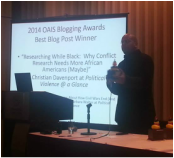Earlier this week the CC Virtual Workshop featured Tiberiu Dragu‘s paper, “The Moral Hazard of Terrorism Prevention.” Regrettably, technical issues prevented us from recording the session to YouTube. That aside, we had a fun and interesting discussion.
And why not? Dragu’s provocative answer is “probably not.” More specifically, he argues that once we take into consideration the strategic interaction of government security agents and dissidents, the former will underinvest in detective work (thereby creating demand for their services), and the latter will sometimes plan more attacks than they would have had the government not restricted civil liberties (e.g., speech, association, assembly but also enhancing surveillance and domestic spying capabilities).
To produce these implications Dragu studies a dynamic game theory model involving security agency of a government and a dissident group using terror tactics. The game has two periods: in the first, the group decides whether to execute attacks, and the agency decides how much effort to expend foiling potential plots. As in any game theory model, the trick is to consider how each actor will behave in each period based on its expectations of what will happen over the course of the interaction. This is where the interesting stuff happens as the actors generate expectations about what is likely to have in subsequent periods influencing what they do in the present.
In particular, Dragu compares two circumstances: one in which, following a terror attack in period one, the government does not restrict civil liberties versus another in which, following a terror attack in period one, the government restricts civil liberties. The results of the model indicate that the security agents will work harder to foil plots in the situation with no restrictions than the one with restrictions. In part, this is explained by the fact that without the restrictions these actors have to work a bit harder to figure out what is going on. Higher levels of repression make security force agents lazy, reducing repressive action. Lower levels of repression make security force agents exert more effort, increasing the amount of repressive action that one would see. Further, depending on the values of some of the model’s parameters, the dissidents will plan more attacks. If you know that you are going to be in a situation where it will be harder to meet, plan, train and execute, then you would ramp up your dissident behavior. The paper challenges the conventional wisdom that civil liberties restrictions reduce challenges and advances the agenda that repression needs to be simultaneously disaggregated tactically as well as considered together.
The paper is part of a book length project in which Dragu draws also from his articles published in AJPS (pdf here) and APSR (pdf here). In those works, he expands the discussion to include the incentives of politicians, and the book will engage an array of models that permit him to enrich the sparse models in each of the papers. This should be an important piece.
Terrence Chapman, Ursula Daxecker and Monika Nalepa served as discussants, and raised a number of excellent suggestions ranging from modeling choices to framing and presentation to empirical implications and beyond. Dragu also engaged the group in discussion about some of his ideas for the book length manuscript as well as this individual paper. A good time was had by all.
@WilHMoo & @engagedscholar

 RSS Feed
RSS Feed
